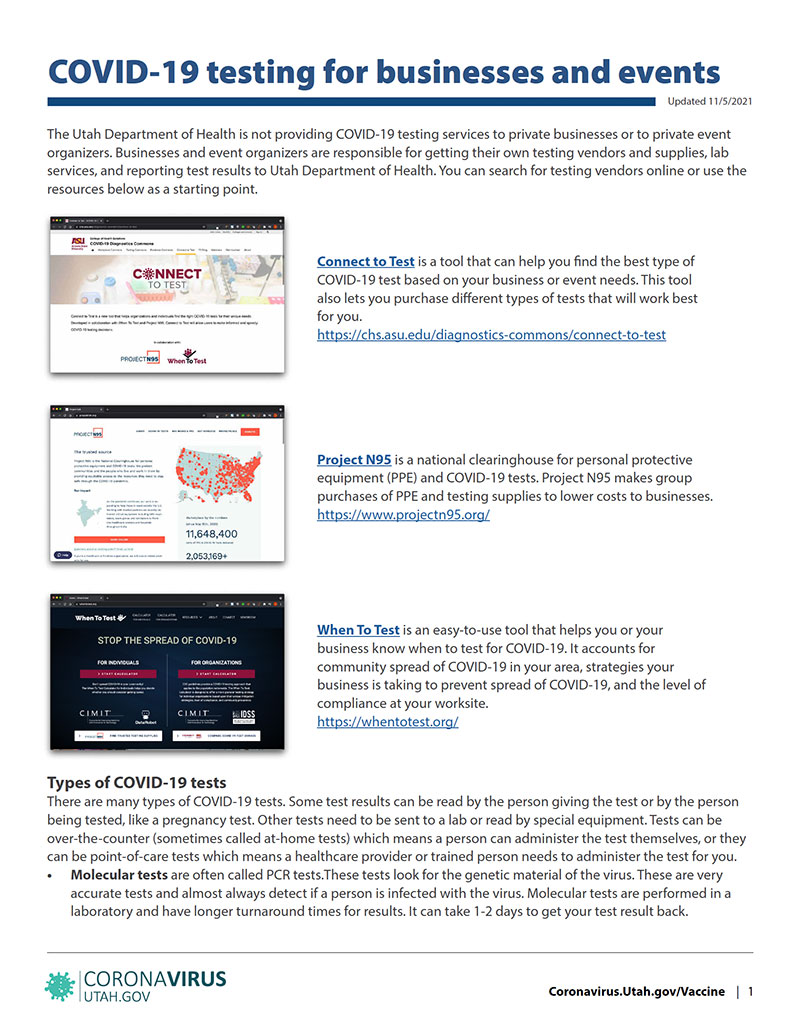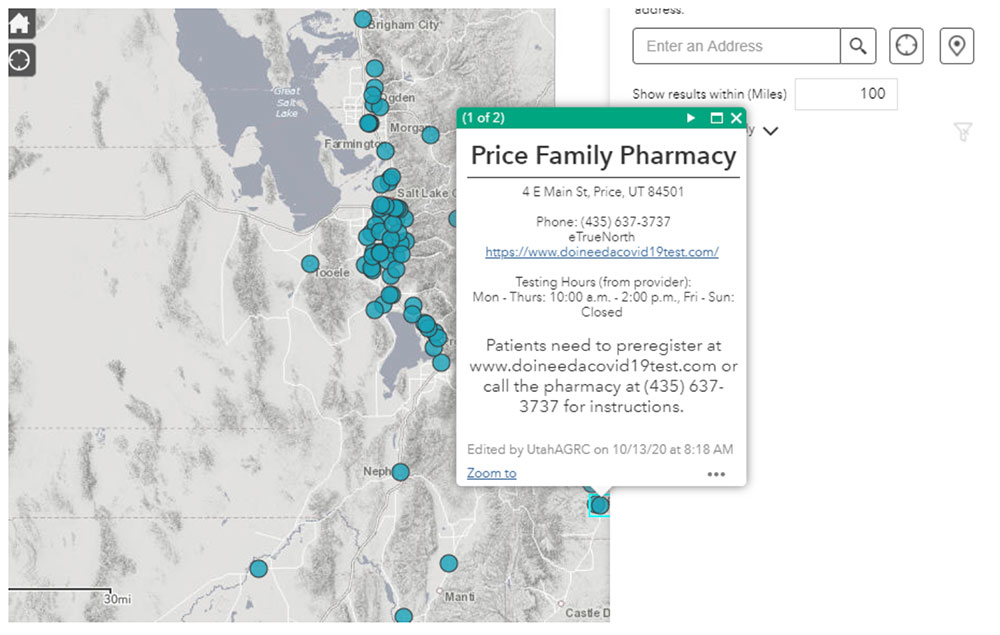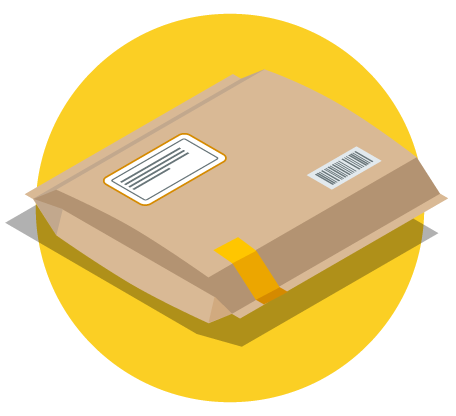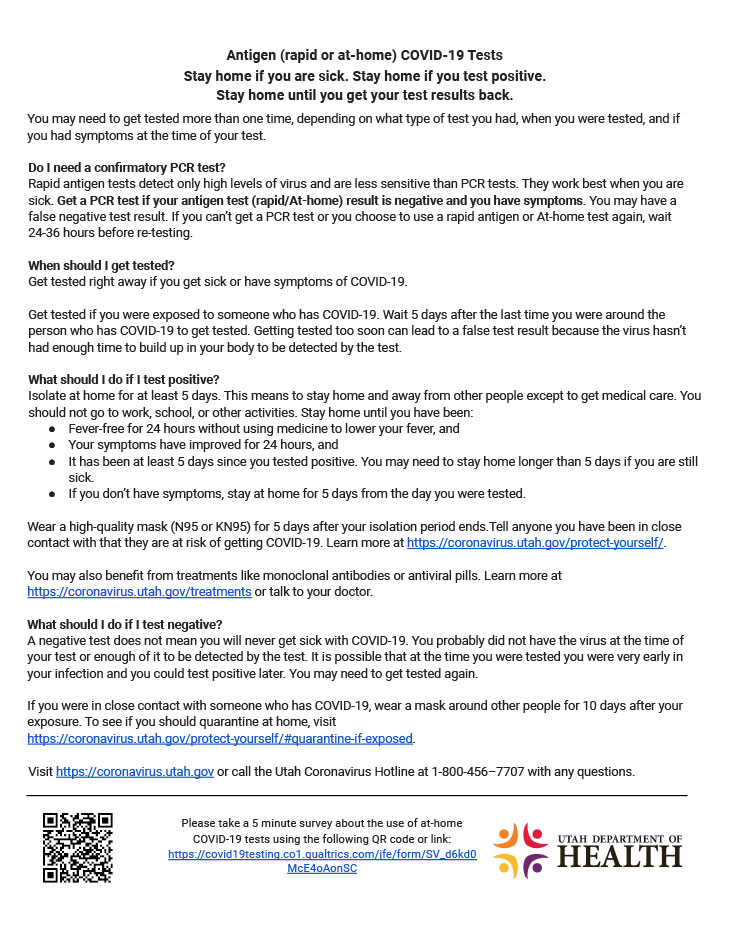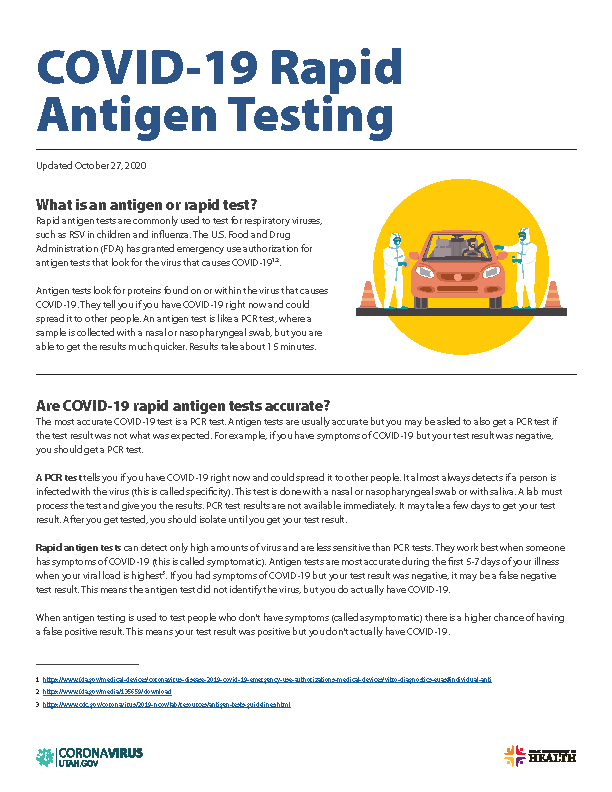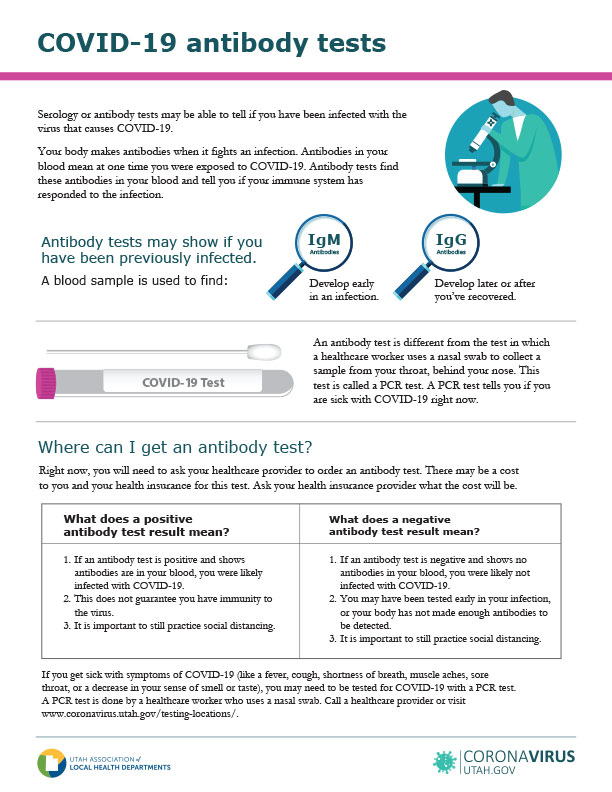COVID-19 Testing Information
Updated 8/25/2022
Who should get tested?
Get tested and stay at home (away from others if possible) if you have symptoms of COVID-19. It’s best to assume you have COVID-19 and follow isolation guidelines. You can use an at-home test or find a testing location.
Some people should get tested and call a doctor about treatments right away if they develop symptoms of COVID-19:
- People who would benefit from COVID-19 treatments and need a positive test to qualify.
- Older individuals and people with high-risk conditions.
- Vulnerable populations and those who work with them, including healthcare settings, long-term care facilities, and congregate settings like prisons and homeless shelters.
We encourage you to take advantage of the increased availability of home (antigen) tests. Use a home test if you’ve been sick but are getting better and want to know for sure if you are negative. You can test positive by PCR for weeks even when you are no longer infectious.
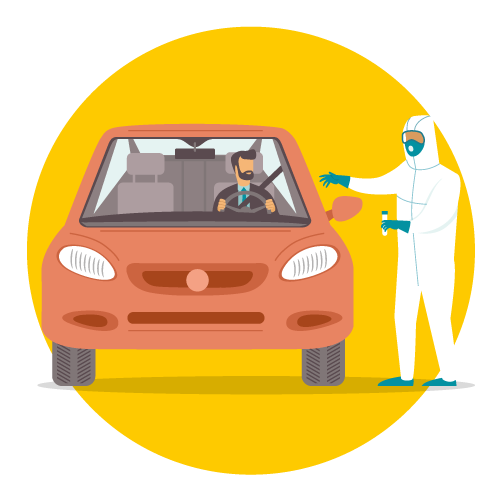
If you were exposed to COVID-19, wait 5 days after your exposure to get tested. This lets enough of the virus build up in your body to be detected by the tests. The vaccines do not interfere with the accuracy of COVID-19 tests. You may need to get tested more than one time, depending on what type of test you had, when you were tested, and if you had symptoms at the time of your test.
We know people can be re-infected with COVID-19. We also know some people can test positive after they have COVID-19 even though they are no longer infectious to other people. The CDC and Utah Department of Health and Human Services recommends you not get tested again for COVID-19 if it’s been less than 90 days (about 3 months) since you first tested positive for COVID-19, as long as you don’t have any new or worsening symptoms. However, if you have any new symptoms or it’s been more than 90 days (3 months) since you tested positive, you should use an antigen test and test again.
We also know people who are vaccinated can get COVID-19 , so to be very safe we suggest you get a COVID-19 test 5 days after you were exposed, even if you are vaccinated.
What kind of test should I get?
Some COVID-19 tests are more accurate than others. Rapid antigen tests (including at-home rapid tests) work best when someone has symptoms of COVID-19. Rapid antigen tests detect only high levels of virus and are less sensitive than PCR tests. Antigen tests are the best tests to use if you want to know for sure when you can end your isolation at home after testing positive. A PCR test looks for the genetic material of the virus. It is a very accurate test and almost always detects if a person is infected with the virus.
Do I need a confirmatory PCR test?
Rapid antigen tests detect only high levels of virus and are less sensitive than PCR tests. They work best when you are sick. Get a PCR test if your antigen test (rapid/at-home) result is negative and you have symptoms. You may have a false negative test result. If you can’t get a PCR test or you choose to use a rapid antigen or at-home test again, wait 48 hours before testing again.
What if I need to get tested for work or to travel?
Some testing locations may provide work and travel related testing. Check with the testing location to see if they offer testing for work or travel. Keep in mind that COVID-19 testing for these types of reasons may not be covered by insurance. Testing providers may also charge a fee for employment or travel related testing. Make sure to call your insurance provider to find out if you will be responsible to pay for the test.
People seeking COVID-19 travel testing will need to find a testing provider which offers the type of test required by their travel destination. You can find testing providers by searching under “test type” here; contacting your travel agent, airline, or travel destination; or doing an online search. The state will no longer provide free travel testing. Travelers are responsible for making sure testing meets the requirements of their travel destination. Learn more
Where can I get tested for COVID-19?
There are many testing locations in Utah. Each testing site has different requirements and may offer different types of COVID-19 tests. Use the COVID-19 testing site locator to find a testing location near you or call a healthcare provider.
How to find a COVID-19 testing site:
- Call a healthcare provider or pharmacy. More pharmacies, clinics, and doctor offices are able to provide testing on-site now.
- Click on the map to find a testing site near you.
- Enter your address and the GPS locator will give you a list of the nearest testing locations.
or - Click on the “Select filters to apply” arrow and search by the name of the testing provider.
- Click on the testing location to bring up the information for that testing site.
- Follow the instructions to register to get tested.
- Enter your address and the GPS locator will give you a list of the nearest testing locations.
The Utah Department of Health and Human Services and Fulgent Genetics now offer mail-based (at-home) PCR testing for Utahns who have symptoms or were exposed to COVID-19 and:
- Live in rural Utah, or
- Can’t leave their home to get tested.
You must register online to see if you qualify for the free mail-based PCR test. It takes about 4 days for you to get your test results after registering. This includes the time it takes for you to get the test in the mail, take your sample at home, and mail it back to Fulgent Genetics. The test will be shipped to you by FedEx and must be returned to Fulgent Genetics by FedEx. Test results from the mail-based PCR tests are reported to the Utah Department of Health and Human Services by Fulgent Genetics.
At-home tests
Many people are now using at-home or self-collection COVID-19 tests. You can buy at-home test kits at pharmacies and stores or order them online.
Most at-home tests are rapid antigen tests. These tests can be done in your own home and you will have your results in 15-30 minutes. Some at-home test kits need to be mailed to a lab for processing and your test results can take several days to get back. It’s important to follow the instructions on the at-home test kits. Vaccinations do not interfere with COVID-19 test results.
Rapid antigen tests (including at-home rapid tests) work best when someone has symptoms of COVID-19. Rapid antigen tests detect only high levels of virus and are less sensitive than PCR tests. Antigen tests can be used for what is called serial testing which means you test for COVID-19 more than once, every few days. Testing every few days helps you to know if you are positive more quickly so you can take precautions and prevent spreading the virus to other people. A PCR test looks for the genetic material of the virus. PCR tests are very accurate and almost always detect if a person is infected with the virus, even if you don’t have symptoms.
Learn more about at-home tests here.
Homebound COVID-19 Test Request Form Individuals requesting in-home COVID-19 testing must be medically homebound. An example of a homebound individual would be If you need the help of another person or medical equipment such as crutches, a walker, or a wheelchair to leave your home.
When should I use an at-home test?
You can use an at-home COVID-19 test:
- If you have symptoms of COVID-19 or feel sick. You should get a PCR test or wait 48 hours to test again with another at-home test if your test result is negative and you’re still sick. Stay home and follow isolation guidelines.
- If it’s been 5 days since you were exposed to someone with COVID-19. Testing too soon with a rapid antigen or at-home test after being exposed can give you a false test result. Follow quarantine guidelines and consider retesting again based on your situation and test result.
- If you need same-day test results to attend an event or gathering. It’s your responsibility to know if an event organizer or business will accept at-home test results to attend. Most travel destinations do NOT accept at-home test results.
Do I need a confirmatory PCR test?
Rapid antigen tests detect only high levels of virus and are less sensitive than PCR tests. They work best when you are sick. Get a PCR test if your at-home test result is negative and you have symptoms or feel sick. You may have a false negative test result. If you can’t get a PCR test or you choose to use an at-home test again, wait 48 hours before re-testing.
Many people worry about false test results when using at-home tests or rapid antigen tests. False test results can happen if you were tested too soon after being exposed to COVID-19 or from when your symptoms started. It can also happen if the sample was collected wrong or you didn’t follow the instructions on the at-home test kits correctly. You are more likely to have a false negative result (meaning you test negative but are actually positive for COVID-19) than a false positive result (meaning you test positive but are actually negative for COVID-19) with at-home tests, especially with the spread of the Omicron variant right now.
Can I use my at-home test longer than the expiration date?
The FDA has extended the expiration dates of many at-home COVID-19 test kits. This means you can use the test even if it’s past the expiration date on the box. You can see if the expiration date for your at-home test has been extended on the FDA website.
What do my at-home test results mean?
Do I need to report at-home test results to the health department?
Most at-home tests are never reported to the health department. However, some at-home COVID-19 test companies ask you to upload your test results to a website or app or have you send in your sample for testing and then report the results to public health.
Call the Utah Department of Health contact tracing team at 385-286-0296 if you want to report your at-home test results to public health.

Is COVID-19 testing free?
Testing providers may charge you a fee to get tested or may bill your health insurance. Most insurers are covering the costs of testing and other COVID-19 related examinations. We recommend you talk to the testing provider or your insurance company before seeking testing if you have questions or concerns. Healthcare providers are required by federal law to post a cash price for COVID-19 tests. This is to inform health insurance companies what to pay if you get tested by a provider that is out-of-network.
If you have questions about a bill, contact your provider and your insurance company to resolve the issue or email the Utah Department of Health at COVID19TestingCoverage@utah.gov.
What are the types of COVID-19 tests?
There are three types of tests related to COVID-19.
PCR test: A PCR test tells you if you have COVID-19 right now and could spread it to other people. A PCR test looks for the genetic material of the virus. It is a very accurate test and almost always detects if a person is infected with the virus. PCR tests are processed in a lab and the results can take a few days to get back. PCR tests are usually done by:
- Nasal or nasopharyngeal swab: A healthcare worker puts a swab into your nose to collect a sample either just inside your nose or reaching further down your throat.
- Saliva: The saliva test is easier to perform, safer for healthcare workers, and more comfortable for the patient. You spit into a cup or tube and your saliva is then tested. The saliva test is as accurate as the swab test.
Rapid antigen test: An antigen test looks for proteins found on or within the virus. It tells you if you have COVID-19 right now and could spread it to other people. An antigen test is like a PCR test, where a sample is collected with a nasal or nasopharyngeal swab, but you are able to get the results much quicker. Results take about 15 minutes.
Antigen tests can detect only high amounts of virus and are less sensitive than PCR tests. They work best when someone has symptoms of COVID-19. Antigen tests are most accurate during the first 5-7 days of your illness when your viral load is highest.
You may need to get a PCR test to confirm the results of your antigen test. You should get a PCR test within 24-48 hours after you got your rapid antigen test if:
- You have symptoms of COVID-19 but your rapid antigen test result was negative.
- You do not have symptoms of COVID-19 and were not in close contact with someone who has COVID-19 but your rapid antigen test result was positive.
Serology or antibody test: Serology, or antibody tests, may be able to tell if you have ever been exposed to the virus that causes COVID-19. They do not tell you if you are infected with the virus that causes COVID-19 right now and can spread it to other people. Antibody tests should not be used to diagnose current infections. A positive antibody test does not guarantee immunity to COVID-19. A sample of your blood is collected and is used to see if your body has made antibodies to the virus. Your body makes antibodies when it fights an infection. Antibodies in your blood mean, at one time, you were exposed to COVID-19. Antibody tests find these antibodies in your blood and tell you if your immune system has responded to the infection. Learn more here.
You should stay at home until you get your test results back. Do not go to work, school, religious services, extracurricular activities, or anywhere else.
If you have symptoms of COVID-19, isolate at home. This means you stay home and away from other people, except to get medical care.
If you were tested by:
Intermountain Healthcare
You may review your results as soon as they’re available through My Health+. You can also visit the website for more information.
Steward Healthcare
If you would like to speak to someone about your health concerns, you can call the case management department at 801-758-3369, or visit the website for additional information.
TestUtah
If you were tested through TestUtah, you should receive an email with instructions on how to get your test result. The email will be sent to the email address you provided when answering the survey. Your results will be available in your Silicon Slopes account. If your account doesn’t show a result yet, then the test is still in process. If you don’t have an account or don’t remember how to access it, call the TestUtah helpline at 801-783-1829.
Any other provider or testing location
Contact the provider where you got tested to get your test results.
What do my test results mean?
Will the health department call me if I test positive or was exposed to COVID-19?
A public health worker will try to contact you by phone, text, or email if you test positive for COVID-19 to conduct a case investigation. Sometimes people call this contact tracing. Right now, health departments across Utah are overwhelmed with the number of people who are testing positive with COVID-19. This means it could take several days for the health department to call or text you after you test positive. Sometimes, you may not get a call or text from the health department after you test positive. This can happen if we do not have the right phone number for you.
Some health departments are not able to do contact tracing right now and are focusing their limited and strained resources on case investigations. However, you may get an exposure notification from Apple or Google if you had turned this technology on with your phone. If you were exposed to someone who has COVID-19 you should follow quarantine guidelines and get tested 5 days after the exposure, even if the health department doesn’t contact you.

